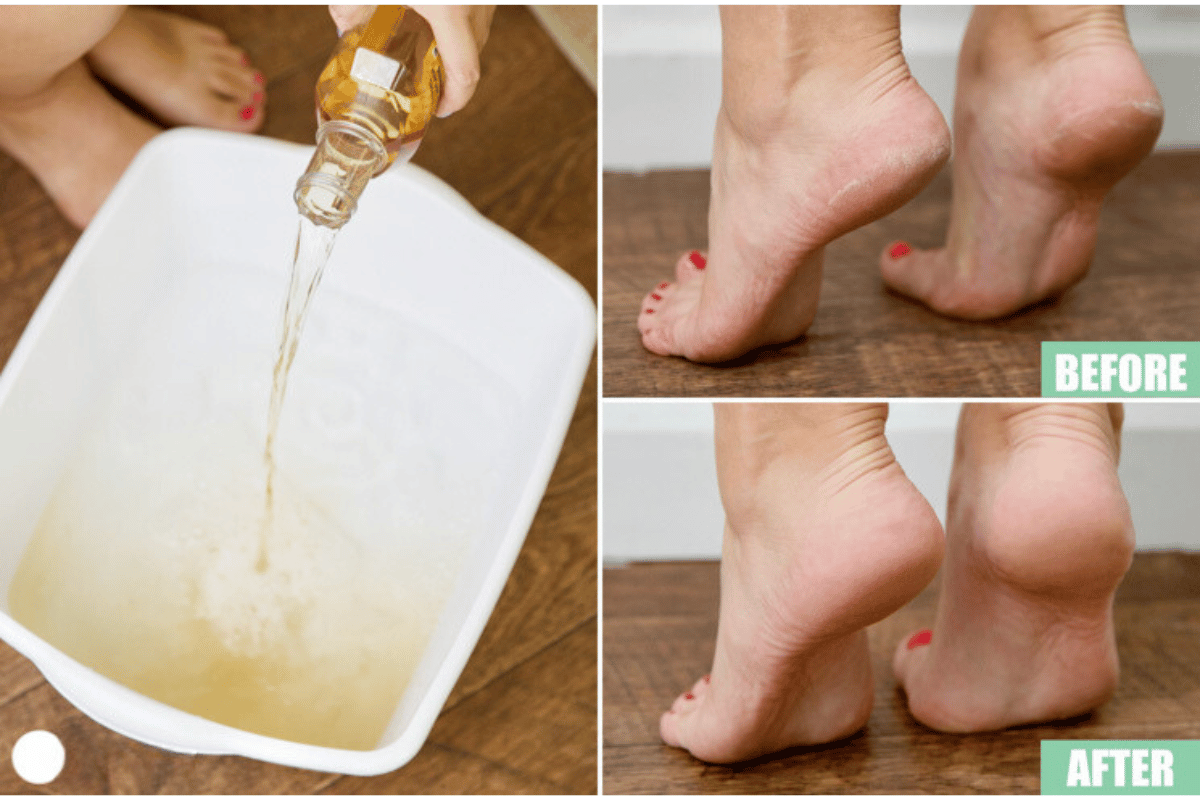In recent years, various natural remedies have emerged as popular options for weight loss, and one that has gained attention is the use of apple cider vinegar on feet for weight loss. While this practice may seem unconventional, it has sparked curiosity among those seeking alternative methods for shedding pounds. The concept involves applying apple cider vinegar (ACV) to the feet, often with claims that it can help boost metabolism, detoxify the body, and accelerate fat burning. But does this method truly work, or is it just another fleeting trend?
This article will explore the concept of using apple cider vinegar on feet for weight loss, diving into its popularity, the claims surrounding its effectiveness, and whether or not there’s any scientific backing to these assertions. By analyzing real-life experiences, potential risks, and alternative methods for weight loss, we’ll determine whether apple cider vinegar on your feet is worth trying as part of your weight loss journey.
Does applying apple cider vinegar to your feet make a difference in rapid weight loss? Let’s break down the facts and myths behind this intriguing practice.

The Alleged Benefits: Detoxification, Metabolism Boost, and Fat Burning
Proponents of this technique often cite the detoxifying effects of apple cider vinegar as a key factor in promoting weight loss. The acidic properties of ACV are believed to help remove toxins from the body and balance the body’s pH levels. This process is said to support metabolic function, aiding in fat-burning and weight reduction.
In addition to detoxification, apple cider vinegar is known to contain acetic acid, which has been shown in some studies to help regulate blood sugar levels and reduce insulin spikes after meals. A balanced insulin response may prevent fat storage and improve the body’s ability to burn fat more efficiently, which could contribute to weight loss over time.
Furthermore, it is claimed that the acetic acid in ACV may help boost metabolism. By stimulating certain enzymes, ACV is thought to improve the breakdown of fats in the body, making it easier for the body to burn calories. This could potentially lead to faster weight loss when combined with a healthy diet and regular exercise.
Scientific Explanation: Does Apple Cider Vinegar Have a Direct Effect on Weight Loss?
Although there are many claims regarding the benefits of ACV for weight loss, the research on its effectiveness specifically when applied to the feet is limited. However, studies on apple cider vinegar itself offer some promising insights. For instance, a study published in the journal Bioscience, Biotechnology, and Biochemistry in 2009 found that acetic acid—the main active compound in ACV—helped decrease body fat percentage and waist circumference in overweight individuals.
However, the mechanism by which apple cider vinegar on feet could have an effect remains unclear. The feet contain various acupressure points and are believed by some to have a connection with other parts of the body through reflexology. Applying ACV to the feet is said to potentially activate these points, promoting better circulation and fat breakdown. While these theories are popular in alternative medicine circles, more research is needed to substantiate the effectiveness of this method.
In summary, while apple cider vinegar itself may offer some benefits for weight loss, there’s no solid scientific evidence to suggest that applying it to your feet directly leads to fat burning or rapid weight loss. ACV might help with digestion, detoxification, and metabolism, but its effect when used on the feet specifically remains speculative.
- Apple Cider Vinegar Weight Loss Recipe A JlbYN Perfect Solution For 2025 Weight Loss
- Apple Cider Vinegar Weight Loss Recipe A Secret To Effective Weight Loss DtQbg
- Apple Cider Vinegar On Feet For Weight Loss Amazing Results You Ll Love NjiOt
User Experiences and Reported Outcomes
Many individuals who have used apple cider vinegar on their feet claim to notice improvements in their energy levels, digestion, and overall health. A common approach is to soak a cotton ball in diluted apple cider vinegar and place it on the soles of the feet, typically wearing socks to keep it in place overnight. People report waking up feeling more refreshed and often note a sense of detoxification and reduced bloating. Some users have even claimed that it helped them shed a few pounds, particularly when combined with a healthier diet and exercise regimen.
One user, Jane, shared her experience: “I started using apple cider vinegar on my feet every night, and within a few weeks, I noticed my digestion had improved, and I was feeling less bloated. While I didn’t see dramatic weight loss right away, I felt more energetic and motivated to work out. Over time, I lost 4 pounds just by sticking to my routine.”
Examining the Effectiveness of This Method for Rapid Results
Despite these positive testimonials, it’s important to note that apple cider vinegar on feet is unlikely to produce rapid weight loss on its own. Most of the reported results include moderate weight loss after consistent use over time, with a focus on general wellness improvements rather than drastic reductions in body fat. Weight loss success with this method seems to be more of a cumulative effect of combining apple cider vinegar with other healthy lifestyle changes, including diet modifications, exercise, and improved hydration.
Some people, like Emily, shared their perspective on how they used ACV as part of a broader wellness routine: “I’ve been using apple cider vinegar on my feet for a few months now. I haven’t lost a ton of weight just from that, but it made me feel better overall. I also started eating cleaner and exercising more, and I’ve lost about 7 pounds during that time.”
While apple cider vinegar on feet may enhance feelings of wellness and support a weight loss journey, it’s clear that its effectiveness is dependent on the broader context of an individual’s lifestyle habits. The method seems to work best when combined with other healthy habits that contribute to overall fat-burning and improved metabolism.
Potential Side Effects and Skin Sensitivity
One of the main risks of applying apple cider vinegar to your feet is skin irritation. ACV is highly acidic, and prolonged contact with the skin can cause redness, dryness, or even chemical burns, particularly in individuals with sensitive skin. This is especially true when ACV is applied undiluted or when it is left on for extended periods.
To minimize the risk of skin irritation, it’s recommended to dilute apple cider vinegar with water or other soothing liquids before applying it to the feet. Starting with shorter exposure times, such as 15 to 20 minutes, can also help prevent skin damage. If any discomfort, burning sensation, or redness occurs, immediately remove the vinegar and wash the affected area with warm water.
How to Safely Incorporate Apple Cider Vinegar in Your Routine
If you choose to use apple cider vinegar on your feet, following safety guidelines is crucial to avoid complications:
-
Dilution: Always dilute the ACV with water to reduce the acidity and prevent irritation. A 1:1 ratio of vinegar to water is a common recommendation.
-
Patch Test: Before using ACV on your feet, conduct a patch test by applying a small amount of diluted vinegar on your skin. Wait for 24 hours to check for any adverse reactions such as redness, itching, or swelling.
-
Moderation: Limit the amount of time the ACV is in contact with your feet. Starting with 15-20 minute sessions and gradually increasing the time can help your skin adjust without causing damage.
Apple Cider Vinegar on Feet Weight Loss: Does It Really Work for Rapid Results?
-
Moisturize: After using ACV, apply a soothing, non-scented moisturizer to your feet to counteract any drying effects caused by the vinegar. This will help keep your skin healthy and nourished.
-
Consult a Professional: If you have existing skin conditions, such as eczema, psoriasis, or sensitive skin, it’s advisable to consult with a dermatologist before incorporating apple cider vinegar into your foot care routine. People with diabetes should also seek professional advice due to the potential for changes in skin sensitivity and circulation.
Possible Interactions with Other Health Conditions or Medications
Apple cider vinegar can interact with certain medications, especially those that affect blood sugar levels, such as insulin or oral diabetic medications. While using ACV topically on the feet is unlikely to cause a significant interaction, it’s important to be cautious, especially if you have any underlying health conditions. Always consult with a healthcare provider if you’re on medication or have a medical condition that could be affected by the acidity of ACV.
In conclusion, while apple cider vinegar on feet may offer benefits for some people, it’s essential to practice caution and consider the potential risks involved. By following proper guidelines for dilution, duration, and skin care, you can minimize adverse effects while incorporating this method into your wellness routine.

1. Intermittent Fasting
Intermittent fasting (IF) has become a popular approach for weight loss in recent years. It involves alternating periods of eating and fasting, to reduce overall calorie intake and allow the body to burn fat more efficiently. Research suggests that intermittent fasting can help boost metabolism, improve insulin sensitivity, and support fat loss.
A study published in Cell Metabolism in 2015 found that intermittent fasting led to significant reductions in body weight and fat mass, while improving overall metabolic health. For those looking to lose weight more rapidly, intermittent fasting offers a proven alternative to using apple cider vinegar on feet.
2. Green Tea
Green tea is widely known for its health benefits, and several studies suggest that it can help with weight loss. It contains catechins, which are natural antioxidants that are believed to boost metabolism and promote fat burning. One of the most studied compounds in green tea, EGCG (epigallocatechin gallate), has been shown to increase fat oxidation and calorie burn, making it an excellent addition to a weight loss plan.
A 2009 study published in the American Journal of Clinical Nutrition found that individuals who consumed green tea extract experienced a significant increase in fat burning, especially during exercise. Drinking a few cups of green tea daily could provide a natural, effective boost for your weight loss journey, without the need for apple cider vinegar application.
3. Regular Exercise (Cardio and Strength Training)
Exercise is a cornerstone of any successful weight loss plan, and it offers a range of benefits beyond what apple cider vinegar on feet can provide. Combining cardiovascular exercise with strength training helps burn calories, increase muscle mass, and promote fat loss. Activities like running, cycling, swimming, and weightlifting are all excellent ways to boost your metabolism and accelerate your progress toward your weight loss goals.
According to the American College of Sports Medicine, a combination of both aerobic (cardio) and resistance (strength) training can maximize fat loss and improve body composition. Unlike apple cider vinegar, which primarily targets wellness from the outside, exercise works from within to enhance fat-burning and muscle toning.
4. Apple Cider Vinegar in Diet
If you enjoy the benefits of apple cider vinegar but prefer to avoid applying it to your feet, you can still incorporate it into your diet. Consuming small amounts of apple cider vinegar (about 1-2 tablespoons mixed with water) before meals is believed to aid in digestion, control appetite, and help regulate blood sugar levels. This approach has been studied more extensively, and many studies support its role in helping with weight loss.
A study published in the Journal of Functional Foods in 2018 found that apple cider vinegar helped reduce blood sugar levels and improved insulin sensitivity, which can support fat burning. Adding it to your diet could provide similar benefits to topical use but with fewer concerns about skin sensitivity.
5. Detox Water
Infusing water with fruits, vegetables, or herbs has long been a popular method for detoxification and weight management. Ingredients like lemon, cucumber, ginger, and mint are often added to water to create a refreshing detox water that helps improve digestion, boost metabolism, and promote fat burning. These natural ingredients contain vitamins and antioxidants that support overall health and can complement a weight loss plan.
For example, lemon is known for its ability to aid digestion, while ginger can help reduce bloating and inflammation. Drinking detox water throughout the day can encourage hydration, which is essential for fat loss, and may provide a gentle alternative to using apple cider vinegar on feet.
6. Healthy Diet and Portion Control
A healthy, balanced diet rich in whole foods such as fruits, vegetables, lean proteins, and healthy fats is essential for sustainable weight loss. Portion control is also crucial to avoid overeating and ensure that you’re consuming an appropriate number of calories for your weight loss goals. Unlike external methods like apple cider vinegar on feet, a diet rich in nutrients provides the body with the fuel it needs for optimal fat-burning and overall health.
Research shows that maintaining a calorie deficit—where you burn more calories than you consume—is the most effective way to lose weight. In contrast, relying solely on topical treatments such as apple cider vinegar on feet may not offer long-term results without complementary lifestyle changes.
While apple cider vinegar on feet for weight loss has its proponents, it’s not the only natural remedy available. Intermittent fasting, green tea, regular exercise, and incorporating apple cider vinegar into your diet are all scientifically backed methods for promoting weight loss. Additionally, focusing on a healthy diet and portion control will yield more sustainable, long-term results.
Incorporating a combination of these approaches can help you achieve your weight loss goals more effectively than relying on one method alone.
1. Does applying apple cider vinegar on feet help with weight loss?
While anecdotal reports suggest that apple cider vinegar on feet may help with weight loss, scientific evidence supporting this claim is limited. Some believe that ACV promotes detoxification and boosts metabolism, but these effects are more commonly seen when ACV is consumed or applied to the skin directly. If you are interested in using this method, it’s important to proceed with caution to avoid skin irritation.
2. What are the risks of using apple cider vinegar on feet for weight loss?
The primary risks of applying apple cider vinegar to your feet include skin irritation, redness, dryness, or even burns due to its acidity. If not diluted properly, ACV can damage sensitive skin. Always dilute the vinegar with water, perform a patch test before applying it extensively, and avoid prolonged exposure to minimize the risk of adverse reactions.
3. How can I safely use apple cider vinegar on my feet for weight loss?
To safely use apple cider vinegar on your feet, always dilute it with water (usually a 1:1 ratio). Start with short application times, around 15-20 minutes, to assess how your skin reacts. If irritation occurs, remove it immediately and rinse the area with warm water. It’s also important to moisturize your feet after using ACV to prevent dryness.
4. Are there other effective methods for weight loss besides apple cider vinegar on feet?
Yes, many proven methods for weight loss do not rely on apple cider vinegar on feet. Some effective approaches include intermittent fasting, regular exercise (both cardio and strength training), green tea consumption, and adopting a healthy diet. These methods are scientifically backed and offer a more comprehensive approach to fat-burning and metabolism-boosting.
5. Is apple cider vinegar on my feet better than consuming it in my diet for weight loss?
Both methods have potential benefits, but consuming apple cider vinegar as part of your diet may be more effective for weight loss than using it topically on your feet. Research suggests that ACV, when consumed in moderation (e.g., 1-2 tablespoons diluted in water), can help with appetite control, improve digestion, and support fat burning. Using it topically on feet may not have the same direct metabolic effects and is more likely to cause skin sensitivity.
Real-Life Results: Success Stories and Testimonials of Apple Cider Vinegar on Feet for Weight Loss
While scientific evidence on the use of apple cider vinegar on feet for weight loss is still limited, many people have reported positive experiences and weight loss success when incorporating this method into their routines. These success stories and testimonials offer insight into how the practice might work for some individuals, even though the results may vary from person to person.
The Risks and Considerations of Using Apple Cider Vinegar on Feet for Weight Loss
While apple cider vinegar on feet for weight loss has its advocates and success stories, it’s essential to consider the potential risks and precautions when incorporating this practice into your routine. Although apple cider vinegar (ACV) is generally regarded as safe for many uses, it can have side effects, especially when not used correctly or excessively. Here are some important risks and considerations to keep in mind:
How Apple Cider Vinegar on Feet is Said to Promote Weight Loss
The practice of using apple cider vinegar on feet for weight loss has gained popularity for its supposed benefits in detoxification, metabolism-boosting, and fat burning. Let’s dive into the claims and explore whether there’s any scientific evidence to support the idea that this method can effectively promote weight loss.
FAQs: Apple Cider Vinegar on Feet for Weight Loss
Alternatives to Apple Cider Vinegar on Feet for Weight Loss
While apple cider vinegar on feet has gained attention for its potential benefits in weight loss, it’s not the only natural remedy available. Several alternative methods for weight loss are backed by science and have proven to be effective for many individuals. Let’s explore some of these options and compare them with the apple cider vinegar method.
Conclusion:
In conclusion, while apple cider vinegar on feet for weight loss has become a popular trend, its effectiveness for achieving rapid weight loss remains uncertain. Although some individuals report positive outcomes, such as enhanced detoxification and improved metabolism, scientific evidence supporting its direct impact on fat burning is limited. The benefits may primarily stem from apple cider vinegar’s properties when consumed or used in more traditional methods, such as in your diet, rather than topical applications.
The practice of using apple cider vinegar on feet should be approached with caution. Risks such as skin irritation and potential interactions with health conditions must be carefully considered before trying this method. Furthermore, there are more well-established and scientifically supported alternatives for weight loss, including intermittent fasting, regular exercise, and incorporating apple cider vinegar into your diet.
For sustainable, long-term weight loss, it’s essential to adopt a holistic approach that includes healthy eating, regular physical activity, and proper self-care. If you choose to try apple cider vinegar on your feet, ensure that you follow the necessary precautions to avoid side effects. However, for most individuals, more conventional weight loss methods will likely prove more effective and safe in the long run.
Ultimately, the decision to try apple cider vinegar on feet for weight loss is a personal one, but it’s essential to weigh the evidence and prioritize your health and safety above all.
apple cider vinegar on feet weight loss

